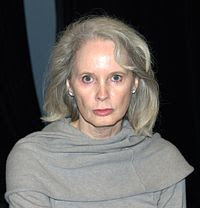I’ve always had a problem with Joan Didion. Once on a long drive I listened to the audiobook of My Year of Magical Thinking. I ended up pulling over to a rest stop and crying. A cop came and asked me if I was ok. It was a big book at the time, everyone found it moving, and I guess the fact that I was in that rest stop means I found it as moving as everyone else. But I remember that, while moved, I was mad at her. There was something about the way she described and remembered her life with husband that grated. She introduced us to their inside references, then picked them up later, as if we would then feel part of the charmed life she was recalling. I’ve always had a weakness for the memoirs of old movie stars rock starts and other creative people with charmed if tragic lives. I think it is likely these books are not good for me. Oh, they make us think, if only I had arrived in the East Village in 1968, I would have met Robert Mapplethorpe. Um, no. But there was something else going on here, something I put my finger on after reading Nick Paumgarten’s profile of James Salter, when he quotes Salter as saying the writer should make the reader envious of the life the writer appears to be leading. I don’t think Didion was necessarily courting our envy, but there was something there, and throughout her writing, that suggests she does not wish us well.
As anyone who’s ever taught composition knows, the “personal essay,” as Didion’s are generally considered to be, has an authority problem and an evidence problem. It’s always at least three parts ethos and pathos to one part logos. So much of Didion’s appeal seems to be wrapped up in a particular ethos, one rooted in the absence of pathos. A cool customer, as she describes herself in Magical Thinking. Presumably she would not start crying while listening to the audio version of her own book. From this ethos comes a recurring argument of sorts: life is tragic, the soft-hearted are fools, the utopians most of all. The essays in Slouching Towards Bethlehem and The White Album, many about some aspect of “the sixties,” circle these themes again and again. As someone who has read a lot about that period and its social movements and will confess to having the nostalgia for it that can only come from not having lived through it, I always thought their arguments were “wrong,” but I took them to be a natural outgrowth of her skepticism, a useful corrective to romanticizations of the period, the ever-elusive “smart conservative” view liberals are always looking for.
But then, recently, I reread her essay “On the Women’s Movement.” It was published in the Times in 1972 and was in included in The White Album. You don’t find it in the composition anthologies the way you find “In Bed,” and “On Self Respect” and “On Keeping a Notebook,” probably because it’s too particular to the moment, too polemical, too untidy to fit snuggly in the section of an anthology dedicated to “identity” or “gender.” And what saturates the essay is not a cool, critical distance, or skepticism, or even irony. It’s contempt. It’s only through this contempt she is able to make sense of the fact that the movement’s radical ideas – which she also dismisses – have found a popular audience. To Didion, this is possible only insofar as these women have mistaken the movement for a program of midlife empowement:
It wrenches the heart to read about these women in their brave new lives. An ex-wife and mother of three speaks of her plan “to play out my college girl’s dream. I am going to New York to become this famous writer. Or this working writer. Failing that, I will get a job in publishing.” She mentions a friend, another young woman who “had never had any other life than as a daughter or wife or mother” but who is “just discovering herself to be a gifted potter.” The childlike resourcefulness-to get a job in publishing, to be a gifted potter-bewilders the imagination. The astral discontent with actual lives, actual men, the denial of the real ambiguities and the real generative or malignant possibilities of adult sexual life, somehow touches beyond words.
I suppose this is what people mean when they said that Didion’s writing is “tough” or “tragic,” but it seems to me nothing but a high-minded way of telling the proles to stay in their place. That women must grapple with “the real ambiguities and the real generative or malignant possibilities of adult sexual life” would seem to mean that they must stay in their marriages, that they must have children, that they must recognize that being a writer is something granted only to a few – presumably, including Didion.
Because wealthy and middle-class women were traditionally raised to dabble in the arts, to use their art history degrees as hostesses and museum volunteers, and because, when turning away from these roles, the idea of “creative expression” was often the language they had to imagine a different life, women like Didion – “real artists” – often felt the need to distinguish themselves from such amateurs and dilettantes. Unlike many of today’s anti-feminist populists, Didion doesn’t care or pretend to care about the women feminists are leading astray with their contempt of the family and so forth. When she says “somehow touches beyond words,” there is no empathy there – she finds these “childlike” women touching because they are pathetic to her. That she is so certain these women are aspiring to something where they have no place suggests that the notion of women as an oppressed class – though not without its problems and complications – is not as ridiculous as she assumed.

